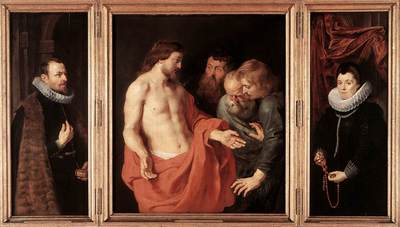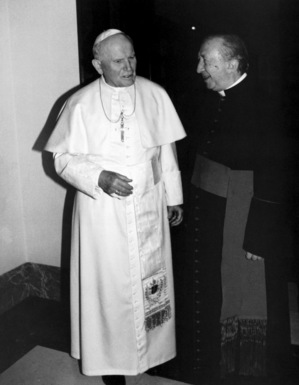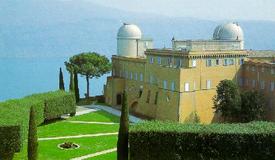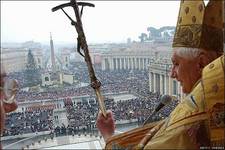Because thou has seen Me, Thomas, thou has believed. Blessed are they that have not seen, and yet have believed, alleluia.
A modern day Martin Luther?
Have you ever thought what a contemporary Martin Luther would criticize?
How to do lectio divina
My friends at St Louis Abbey posted this cheat-cheat on doing lectio divina encouraging us to dig deeply into this very necessary form of prayer. All good things are derived from the daily practice of lectio divina. As the monks will tell you, lectio is not only for monks but for the entire Church.
Lectio divina is a way of getting in touch daily in a personal way
with the Father, the Son and the Holy Spirit; it is a way of getting in touch with Jesus Christ our Lord and our brother. It is away of reading centered on God and, if you do it with faith you will be able to hear what he has to say to you here at this moment. It is a way of reading which is slow so that the words are savored in meditation. It moves from the literal meaning to what only the Spirit can make clear to you. It calls for action by your involvement and for passive surrender as it draws you into the heart of God. It is disinterested; the text must be read for its own sake and not for the achievement of having read it.
Lectio is a way of experiencing Jesus Christ. You will encounter him personally in the sacred scriptures because he is there hidden in the pages of your Bible and you ought to believe in his presence with greater assurance than if you could see him with your eyes. He has the same power there as he revealed in the gospels and he cures you of your physical and moral ailments, brings his light to your everyday life and leads you to eternal life.
Your encounter is with the Word who loves you unconditionally and is ever present and real in your life. From all eternity God has had a plan for the whole course of your life, your personal fulfillment, your vocation, your happiness. You will surely stray from the right path and become alienated from your true self through serving other gods, if you do not allow him to reveal himself to you daily through his word. It is in
your Bible that the true story of your life is written. If you don’t at once
understand what you read, then have confidence that the Lord will reveal it to you in his own time, because no word comes form the mouth of the Lord without achieving in you the work he intended. If your thoughts and imagination get in the way of your prayer, then fling them immediately before Christ. Make no attempt to master them by your own strength, but try to turn back to your prayer.
You ought to do lectio every day, even if it is only one single verse of the Bible, because, “It is not on bread alone that man lives but on every word that comes from the mouth of God.” (Matthew 4:4) Your reading of the word of God should be deliberate, moving slowly from verse to verse, from word to word, watching for the context, paying close attention to each passage, looking out for the answers that are there in sacred scripture itself and the echoes they evoke, watching the notes and marginal references and always treasuring silence so as to make space to listen. You should know that the word you hear is directed to you personally and individually. When you read the word of God, it
speaks to you; when you pray, you speak to the word and so turn your prayer into conversation.
Your prayer may be simply staying with the word in silence, or it may be a thanksgiving, or a petition, or praise, or blessing, or contrition, or intercession, or one single word on which you pause and then repeat at will, or it may be a prayer of inspiration. If you are taking part in shared lectio, the way to share what the scripture has said to you is by means of a personal comment spoken in the first person singular and applied to your own life, or else it may be a prayer out loud offered directly to God.
José Manuel Eguiguren Guzman of the Manquehue Movement, Chile; translated by Abbot Patrick Barry, OSB
Saint Anselm on the Divine Will
For these three persons do not have will or power according to their relationships but rather according to the fact that each single person is God.
Progress in John Paul’s beatification process
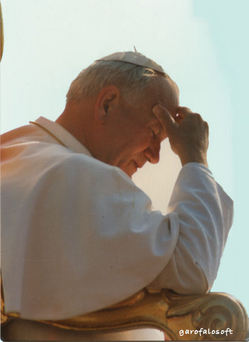 Yesterday morning [June 30] there was help at the Congregation
Yesterday morning [June 30] there was help at the Congregation
for Causes of Saints the second meeting of the theological consultors tasked to
examine the “Positio,” that is the documents and testimonies of the
cause for beatification of John Paul II. In the first meeting, about
which Il Giornale has spoken, was held on 13 May. But it had an
intermediate (or interlocutory… “interlocutorio”) outcome, because of
critical point raised not about the personal sanctity of Pope Wojtyla but about
the manner in which the work was advanced and the lack of documentation.
The postulator of the cause, Msgr. Slawomir Oder, responded in writing to the
objections and yesterday there was held the second and final meeting of the
theologians, which had given a favorable majority opinion. Two of them
maintained the initial “suspended judgment” (“sospensivo”)
because they though that the proofs and documents ought to have been integrated
(“il quadro probatorio e documentale debba essere integrato”). This is the article that was published in today’s Il Giornale. Now the
“Positio” goes to the cardinal and bishop members of the
Congregation, who before the end of the year will make a decision about the
heroic virtue of Pope Wojtyla. Then it will fall to Pope Benedict to
promulgate the decree which will bring his predecessor to beatification.
translation of Andrea Tornielli’s article)
John Paul II speaking of Communion and Liberation
On 31 March 197 Pope John Paul II said of Communion and
Liberation: “I like this name very much.” Here’s his explanation:
So you too,
young people, beloved young people, have shown, in the very name chosen to
describe your movement “Communion and Liberation” (I must say that I
like this name very much, I like it for many reasons: for a theological reason
and for, I would say, an ecclesiological reason. This name is so closely linked
with the ecclesiology of Vatican II. Then I like it because of the perspective
it opens to us: the personal, interior perspective and the social perspective:
Communion and Liberation. For its topicality, this is the task of the Church
today: a task which is expressed precisely in the name “Communion and
Liberation.” With this name, therefore, you have shown that you are well aware
of the deepest expectations of modern man.
The liberation to which the world
aspires–you have reasoned–is Christ; Christ lives in the Church; man’s true
liberation takes place, therefore, in experience of ecclesial communion; to
build up this communion is, therefore, the essential contribution that
Christians can make to the liberation of all.
Vatican Observatory Moves
The Jesuit report that after residing
more than seventy years within the papal summer Palace itself, the headquarters of the Vatican Observatory recently moved to a new
location in the Papal Gardens at Castelgandolfo. The move was occasioned by
increased demands for space within the Palace, and the growing needs of the
Observatory. Until few weeks ago, the observatory offices were located on the
top floor of Papal Palace, the Pope’s summer home located in the Alban Hills,
25 kilometers southeast of Rome. Its extensive astronomical library is
scattered over four rooms on the top two floors of the Palace, while the
valuable meteorite collection and laboratory, the historic vault of
photographic observations made at the Observatory from 1895 to 1979, and the
classroom where the biennial Vatican Observatory Summer Schools are conducted,
are located on the ground floor of the Palace. Meanwhile, the living
quarters of the Jesuits is divided between rooms on the second and top floors.
With the prospect of half a dozen younger Jesuits joining the staff over the
next five years, the issue of both residence and office space was becoming
acute.
“Moving the Observatory collections and libraries has been
a logistical challenge,” noted Father José Funes, the Argentinean
Jesuit and director of the observatory. “But the new site will allow us to
address a growing need for space and order.” The new quarters,
located in the remodelled monastery built by the Basilian monks within one of
the most beautiful gardens in the Italian peninsula, should provide a far more
peaceful and comfortable setting. The Vatican Observatory traces its
history to the reform of the calendar by Pope Gregory XIII in 1583. It was
re-organized by Pope Leo XIII in 1891, “so that everyone might see clearly
that the Church and her Pastors are not opposed to true and solid science,
whether human or divine, but that they embrace it, encourage it, and promote it
with the fullest possible devotion.”
Blessed Junipero Serra
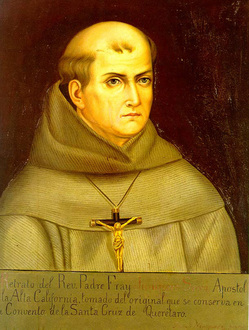 My words that I have put in your mouth, says the Lord, will never be absent from your lips, and your gifts will be accepted on my altar.
My words that I have put in your mouth, says the Lord, will never be absent from your lips, and your gifts will be accepted on my altar.
Pope Benedict XVI’s prayer intentions, July 2009
The general intention
That Christians in the Middle East may live their faith in complete freedom and
become instruments of reconciliation and peace.
The missionary intention
Through the witness of the faithful, may the Church be the seed and
soil of a humanity reconciled to be God’s one true family on earth.
Ecumenical work requires respect & love
Respect and love are essential in the work of ecumenical dialogue, the Pope
observed at a gathering of Orthodox leaders in Rome for the Solemnity of Saints
Peter and Paul. Each year the Patriarch sends a delegation to Rome for June
29th and the Pope reciprocates by sending a delegation to Constantinople for
the feast of Saint Andrew on November 30th to share in prayer, dialogue and
fraternity. Watch the video clip.
A hallmark of Pope Benedict’s petrine ministry is ecumenical
relations with other Christians, most particularly with the Orthodox churches. Yesterday
he said:
“You are welcome guests, dear brothers, who have been sent by His
Holiness the Ecumenical Patriarch, to whom I likewise send my warm and
fraternal greeting in the Lord. Let us give thanks together to the Lord for all
the fruits and benefits that the bimillennial celebration of the birth of St.
Paul has brought us. We celebrate together the feast of Sts. Peter and Paul,
the “protôthroni” of the Apostles, as they are invoked in the
Orthodox liturgical tradition, that is, those who occupy first place among the apostles
and are called “the teachers of the ecumene.”
With your presence,
which is a sign of ecclesial fraternity, you remind us of our common commitment
to the pursuit of full communion. You already know, but again today I have the
pleasure of confirming, that the Catholic Church intends to contribute in every
possible way to the reestablishment of full communion. This is in response to
Christ’s will for his disciples, and recalling Paul’s teaching in which he
reminds us that we have been called to “one hope.” In this respect, we
can confidently look forward to a good continuation of the work of the Mixed
International Commission for Theological Dialogue between the Orthodox and
Catholic Churches.
This commission will meet in October to address a crucial
theme for relations between East and West, namely, “the role of the Bishop
of Rome in the communion of the Church during the first millennium.” In
effect, the study of this aspect is clearly indispensable for generally getting
to the heart of the question in the current context of the pursuit of full
communion. This commission, which has already accomplished important work, will
be generously received by the Orthodox Church of Cyprus, to whom we express our
gratitude in advance, because fraternal hospitality and the climate of prayer
that will surround our discussions cannot but facilitate our common work and
reciprocal understanding.
I desire that the participants in the Catholic-Orthodox
dialogue know that my prayers will accompany them and that this dialogue has
the complete support of the Catholic Church. With my whole heart I hope that
the misunderstandings and the tensions between the Orthodox delegates during
the last plenary sessions of this commission be overcome in fraternal love, in
such a way that this dialogue be amply representative of the Orthodox.”
On a related note, I can’t help but draw our attention to
one of the ongoing works in the ecumenical movement today is the superb work of
Prior Enzo Bianchi of the Monastery of Bose (in Italy). His monastery has
sponsored a creative renewal in religious life for men and women, a vibrant
program for the intellect, an awareness of the arts, and real fraternity. Bose
is sponsoring the 17th International Ecumenical Conference on Orthodox
Spirituality this coming September 2009. The program is exciting; the theme is
the spiritual struggle looking keenly on the relation of spiritual struggle
with Christian unity in the contemporary world.
